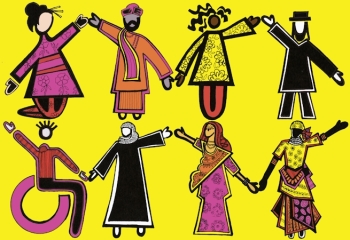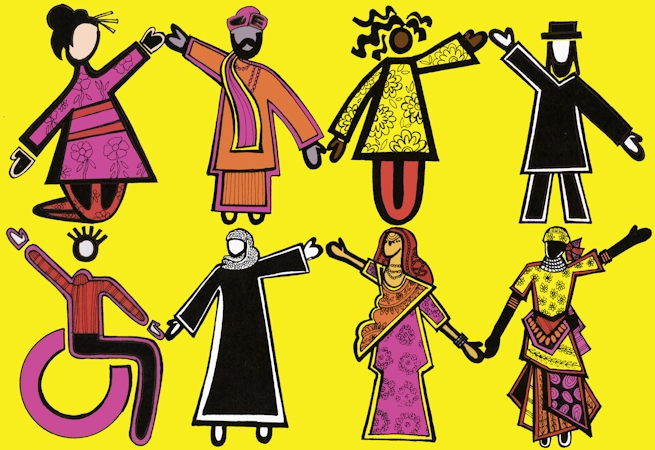
.png) Sunny Jacob
Sunny Jacob

“We may have different religions, different languages, different coloured skin, but we all belong to one human race" -- Kofi Annan
We live and experience in a world full of diversities, of culture, of ethnicity, and of religion, and language. Each culture, region, religion, and each language are unique as each human being is. Therefore, any idea of imposition of one’s culture on others is unacceptable and unwanted. Many problems of the world are due to the attempts to make someone’s culture dominant to others. To an extent, the divisions among nations, disharmony in the society, violence among people, wars between countries, etc. are owing to attempts of cultural hegemony of one nation or group on another.
The recent ethnic and communal clashes in Manipur, and the recurring religious and cultural violence due to hatred among various communities is a concern for educators. The horrible violence and arson are a blotch to Indian democracy and secularism. We believe that only education can bring awareness and harmony among people.
That is why Jesuit education came up with the proposal to start a course on “Global Citizenship” for Jesuit educators. The core aspect of Global Citizenship in Jesuit Education is that of Inter-culturality. In 2019 Global Catholic education came up with Global Compact on education, which also talks about the need for intercultural communication in education.
Inter-culturality refers to the existence and equitable interaction of diverse cultures and the possibility of generating shared cultural ex
Fr. Arturo Sosa SJ has brought out six emerging challenges in the globalised world that educators must be aware of and act up on. They are:
First, there is an unprecedented demographic change.
Second, we are faced by growing inequity.
Third, polarization and conflict are on the rise. Fanaticism, intolerance, the desire to generate terror, acts of violence and even war are increasing.
Fourth, the ecological crisis that affects our planet, what Pope Francis calls our “common home”.
Fifth, the expansion of a digital habitat or culture. The Internet and social networks have changed how humans think, react, communicate, and interact.
Sixth, the weakening of politics as a search for the common good. Politics seem to be doing more harm than good.
To overcome these pressing problems he suggests, “Ideally, each human being, or each people, should feel like a part of humanity, and be aware of their own culture (enculturation), without making it absolute. They should do so critically, joyfully acknowledging the existence of other human beings with different cultures (multiculturality), and establishing relationships of equality with them, enriching themselves with a diversity of cultures that includes their own (interculturality). Universality experienced in this way may become a way of promoting social justice, fraternity, and peace in the world. Interculturality inherently includes dialogue among peoples and cultures.
Pope Francis says about interculturality and dialogue, "If there is one word that we should never tire of repeating, it is this: dialogue. We are called to promote a culture of dialogue by every possible means and thus to rebuild the fabric of society. ….. Peace will be lasting in the measure that we arm our children with the weapons of dialogue, that we teach them to fight the good fight of encounter and negotiation. In this way, we will bequeath to them a culture capable of devising strategies of life, not death, and of inclusion, not exclusion.”
We are living in a globalised world, where boundaries of nations, cultures, religions, and regions are fading away. Today we witness multi-cultural and multi-linguistic intermingling as a reality in any parts of the world. No nation or culture can claim to be independent and exclusive. In fact, right word is inter-dependence rather than independence. It is true that cultural differences should not separate us from each other, but rather cultural diversity brings a collective strength that can benefit all of humanity. This is very important for schools today. Intercultural and cross-cultural education only can build a future of harmony and peace.
Fr. Arturo Sosa SJ says, “We have enormous capacity to awaken hope in our world, contributing to the formation of men and women who are just, true global citizens, capable of generating dialogue and reconciliation among peoples and with creation” (Fr. Sosa, JESEDU-Rio2017). Diversity and difference are gifts to be celebrated to create an inclusive society. God is the loving creator of all things, and in God we find our commonality and solidarity.
Our world, and our country today are tainted by polarization and fear of difference. Intolerance is taking different forms: extreme nationalism, religious fanaticism, ethnic fundamentalism, tribalism, racism, sexism, and sectarianism. There is organised hate-mongering against one community by another. This hate takes its violent form, as we saw in Manipur, at any silly triggering point. In the name of a clash, the organised groups take advantageous and destroy the properties, houses, vehicles, personal, and worshiping places. Once the economy of group is destroyed it will take long time to restore it.
The generation of children, students, and youth keeps growing in hatred and revenge. The result will be more hatred and more violence. They will grow into ghetto mentality. It is a contradiction to see on one side globalisation is happening in many areas, and at the same time there is increased regionalism and narrow domestic walls are erected in many parts of the world.
This emerging contradictory world invites Catholic schools to be proactive participants in building a world where intercultural dialogue take place. We have a legacy of strong spiritual footing that embraced the process of inculturation: We are to find God in all places, and cultures, while bringing the Gospel message of divine compassionate love to our students and people. Therefore, the Catholic education should respond positively and actively to the diversity of its students, teachers, parents, communities, and celebrate these diversity as a gift.
The following steps may help our schools to strengthen Inter-cultural education:
1. Understanding of the notion of culture. It can be through seminars and exposure programmes.
2. Analysing traits of cultural identity. It can be very interesting to learn and will help to respect each culture.
3. Measuring stereotypical thinking and its limitations. Every culture has positive and negative sides. But stereotyping a culture and branding them is unfair.
4. Sharing and reflecting on experiences of prejudice, discrimination, and exclusion. There is a saying that cultural prejudices are ‘Partially true and totally false’. Prejudice against any culture is going to have disastrous consequence.
5. Examining the nature of power in relationships between conventional and marginal groups. Mainstream cultures have more exposure, media influence, social dominance etc. However, we need to understand the richness of all, including the marginal groups too with equity and justice.
6. Gaining an understanding of diversity which will help us to grow in ‘unity in diversity’.
7. Global citizenship and intercultural communication in our schools are a must, especially in our times. We must proclaim to the world that our Schools are committed to Interculturality.
8. Introduce purposeful courses like Global Citizenship, Global Compact on education, Intercultural Communication, and Socio-cultural Analysis.
9. Forming Peace Clubs in our schools can be a great initiative to build a harmonious society.
10. Students exchange programme can be an effective way of experiencing Cultural diversity and learn to respect it.
11. Provide critical support by training teachers to explore themes of diversity, multiculturalism, tolerance, and peace and encourage the development of mutual understanding across the boundaries of caste, creed, language, and region.
12. The basis of all these must be the preamble of Indian Constitution.
As the living tradition exhorts us, “Each of us is called to be learners as well as teachers, engaged in the crucial activity of civil discourse for further understanding. In acknowledging that all are created in the image of God, our education should strive to give equal opportunities for all to participate equitably towards their holistic development. Diversity and difference are gifts to be celebrated to create an inclusive society. God is the loving creator of all things, and in God we find our commonality and solidarity.” We shall adhere to these ideals as Global educators of Catholic schools.
(The Author is the Assistant Secretary of Global Jesuit Education (Rome), and a Team member of www.educatemagis.org (Ireland).